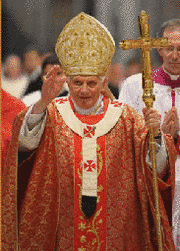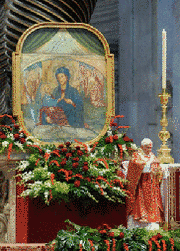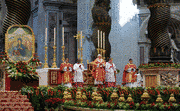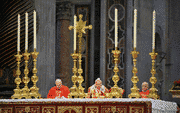Pentecost - Pentecostés - Pentecôte 2010
Pope Benedict XVI's Homily at Holy Mass on the Solemnity of Pentecost
- in English, French, German, Italian, Portuguese & Spanish
"Dear Brothers and Sisters,
In the solemn celebration of Pentecost we are invited to profess our faith in the presence and in the action of the Holy Spirit and to invoke his outpouring upon us, upon the Church and upon the whole world. With special intensity, let us make our own the Church's invocation: Veni, Sancte Spiritus! It is such a simple and spontaneous invocation, yet also extraordinarily profound, which came first of all from the heart of Christ. The Spirit is indeed the gift that Jesus asked and continues to ask of his Father for his friends; the first and principal gift that He obtained for us through his Resurrection and Ascension into heaven.
Today's Gospel passage, which has the Last Supper as its context, speaks to us of this prayer of Christ. The Lord Jesus said to his disciples: "If you love me, you will keep my commandments. And I will pray the Father, and he will give you another Counsellor, to be with you for ever" (Jn 14: 15-16). Here the praying heart of Jesus is revealed to us, his filial and fraternal heart. This prayer reaches its apex and its fulfilment on the Cross, where Christ's invocation is one with the total gift that He makes of Himself, and thus his prayer becomes, so to speak, the very seal of his self-gift out of love of the Father and humanity. Invocation and donation of the Holy Spirit meet, they permeate each other, they become one reality. "And I will pray the Father, and He will give you another Counsellor, to be with you for ever." In reality, the prayer of Jesus - that of the Last Supper and that on the Cross - form a single prayer that continues even in heaven, where Christ sits at the right hand of the Father. Jesus, in fact, always lives his intercessional priesthood on behalf of the people of God and humanity and so prays for all of us, asking the Father for the gift of the Holy Spirit.
The account of Pentecost in the Book of the Acts of the Apostles - we listened to it in the First Reading (cf Acts 2: 1-11) - presents the "new course" of the work that God began with the resurrection of Christ, a work that involves man, history and the cosmos. The Son of God, dead and risen and returned to the Father, now breathes upon humanity, with untold energy, the divine breath, the Holy Spirit. And what does this new and powerful self-communication of God produce? Where there are divisions and estrangement, the Paraclete creates unity and understanding. The Spirit triggers a process of reunification of the divided and dispersed parts of the human family. People, often reduced to individuals in competition or in conflict with each other, when touched by the Spirit of Christ, open themselves to the experience of communion, which can involve them to such an extent as to make of them a new body, a new subject: the Church. This is the effect of God's work: unity; thus unity is the sign of recognition, the "visiting card" of the Church throughout her universal history. From the very beginning, from the day of Pentecost, she speaks all languages. The universal Church precedes the particular Churches, and the latter must always conform to the former according to a criterion of unity and universality. The Church never remains a prisoner within political, racial and cultural confines; she cannot be confused with States nor with Federations of States, because her unity is of a different type and aspires to transcend every human frontier.
From this, dear brothers, derives a practical criterion for discerning Christian life: when a person or a community limits itself to its own way of thinking and acting, it is a sign that it has distanced itself from the Holy Spirit. The path of Christians and of the particular Churches must always coincide with the path of the one, catholic Church, and harmonize with it. This does not mean that the unity created by the Holy Spirit is a kind of egalitarianism. On the contrary, that is rather the model of Babel, or in other words, the imposition of a culture characterized by what we could define as "technical" unity. In fact, the Bible tells us (cf Gen 11: 1-9) that in Babel everyone spoke the same language. At Pentecost, however, the Apostles speak different languages in such a way that everyone understands the message in his own tongue. The unity of the Spirit is manifest in the plurality of understanding. The Church is one and multiple by her nature, destined as she is to live among all nations, all peoples, and in the most diverse social contexts. She responds to her vocation to be the sign and instrument of the unity of the human race (cf Lumen gentium, 1) only if she remains autonomous from every State and every specific culture. Always and everywhere the Church must truly be catholic and universal, the house of all in which each person can find a place.
The account of the Acts of the Apostles offers us another very concrete indication. The universality of the Church is expressed by the list of peoples according to the ancient tradition: We are "Parthians, Medes, Elamites", etc. Here one may observe that St Luke goes beyond the number 12, which itself always expresses a universality. He looks beyond the horizons of Asia and northwest Africa, and adds three other elements: the "Romans", that is, the Western world; the "Jews and proselytes", encompassing in a new way the unity between Israel and the world; and finally "Cretans and Arabians", who represent the West and the East, islands and land. This opening of horizons subsequently confirms the newness of Christ in the dimension of human space, in the history of the nations. The Holy Spirit involves individuals and peoples and, through them, overcomes walls and barriers.
At Pentecost the Holy Spirit manifests itself as fire. The Spirit's flame descended upon the assembled disciples, it was kindled in them and gave them the new ardour of God. Thus what Jesus had previously said was fulfilled: "I came to cast fire upon the earth; and would that it were already kindled!" (Lk 12: 49). The Apostles, together with diverse communities of the faithful, carried this divine flame to the far corners of the earth. In this way they opened a path for humanity, a luminous path, and they collaborated with God, who wants to renew the face of the earth with his fire. How different is this fire from that of war and bombing! How different is the fire of Christ, spread by the Church, compared with those lit by the dictators of every epoch of the last century too who leave scorched earth behind them. The fire of God, the fire of the Holy Spirit, is that of the bush that burned but was not consumed (cf Ex 3: 2). It is a flame that blazes but does not destroy, on the contrary, that, in burning, brings out the better and truer part of man, as in a fusion it elicits his interior form, his vocation to truth and to love.
A Father of the Church, Origen, in one of his Homilies on Jeremiah, cites a saying attributed to Jesus, not contained in the sacred Scriptures but perhaps authentic, which reads: "Whoever is near to me, is near to the fire" (Homily on Jeremiah, L. I [III]). In Christ, in fact, there is the fullness of God, who in the Bible is compared to fire. We just observed that the flame of the Holy Spirit blazes but does not burn. And nevertheless it enacts a transformation, and thus must also consume something in man, the waste that corrupts him and hinders his relations with God and neighbour. This effect of the divine fire, however, frightens us; we are afraid of being "scorched" and prefer to stay just as we are. This is because our life is often based on the logic of having, of possessing and not the logic of self-gift. Many people believe in God and admire the person of Jesus Christ, but when they are asked to lose something of themselves, then they retreat; they are afraid of the demands of faith. There is the fear of giving up something pleasant to which we are attached; the fear that following Christ deprives us of freedom, of certain experiences, of a part of ourselves. On the one hand, we want to be with Jesus, follow him closely, and, on the other, we are afraid of the consequences entailed.
Dear brothers and sisters, we are always in need of hearing the Lord Jesus tell us what he often repeated to his friends: "Be not afraid." Like Simon Peter and the others we must allow his presence and his grace to transform our heart, which is always subject to human weakness. We must know how to recognize that losing something indeed, losing ourselves for the true God, the God of love and of life is actually gaining ourselves, finding ourselves more fully. Whoever entrusts himself to Jesus already experiences in this life the peace and joy of heart that the world cannot give, and that it cannot even take away once God has given it to us. So it is worthwhile to let ourselves be touched by the fire of the Holy Spirit! The suffering that it causes us is necessary for our transformation. It is the reality of the Cross. It is not without reason that in the language of Jesus "fire" is above all a representation of the mystery of the Cross, without which Christianity does not exist. Thus enlightened and comforted by these words of life, let us lift up our invocation: Come, Holy Spirit! Enkindle in us the fire of your love! We know that this is a bold prayer, with which we ask to be touched by God's flame; but above all we know that this flame and it alone has the power to save us. We do not want, in defending our life, to lose eternal life that God wants to give us. We need the fire of the Holy Spirit, because only Love redeems. Amen."
BXVI - St Peter's, Sunday, 23 May 2010 - © Copyright 2010 - Libreria Editrice Vaticana
....
Papa Benedetto's words at the Regina Caeli
- in English, French, German, Italian, Portuguese & Spanish
"Dear Brothers and Sisters,
Fifty days after Easter we celebrate the Solemnity of Pentecost, in which we recall the manifestation of the power of the Holy Spirit, who as wind and as fire descended upon the Apostles gathered together in the Upper Room, and enabled them to preach the Gospel to all nations with courage (cf. Acts 2: 1-13). The mystery of Pentecost, which we rightly identify with the event of the Church's true "baptism", is not, however, exhausted by this. The Church in fact lives constantly from the outpouring of the Holy Spirit, without which she would exhaust her own strength, like a sailboat without the wind. Pentecost is renewed in a special way in certain powerful moments, whether this be at the local or the universal level, whether it be in small assemblies or in large ones. The Councils, for example, had sessions graced by special outpourings of the Holy Spirit, and among these is certainly the Second Vatican Ecumenical Council. We might also recall that famous meeting of the ecclesial movements with Venerable John Paul II, here in St Peter's Square, precisely on Pentecost in 1998. But the Church knows countless "pentecosts" that vivify the local communities. Let us think of the liturgies, particularly those experienced in special moments of the community's life, in which the power of God is perceived in an evident way, infusing joy and enthusiasm in hearts. We may think of many other prayer gatherings in which young people clearly feel the call of God to root their lives in his love, even consecrating themselves entirely to him.
Thus there is no Church without Pentecost. And I would like to add that there is no Pentecost without the Virgin Mary. This is how it was at the beginning, in the Upper Room, where the disciples "with one accord devoted themselves to prayer, together with the women and Mary the Mother of Jesus, and with his brethren", as the Acts of the Apostles says (1: 14). And this is how it always is, in every place and in every time. I witnessed it a short time ago at Fatima. What did that great multitude on the square in front of the Shrine experience, where we were truly all of one heart and one soul? It was a renewed Pentecost. In our midst was Mary, the Mother of Jesus. This is the typical experience at the great Marian sanctuaries Lourdes, Guadalupe, Pompeii, Loreto or even in the smaller ones. Wherever Christians gather in prayer with Mary, the Lord grants his Spirit.
Dear friends, on this Feast of Pentecost, we too would like to be spiritually united with the Mother of Christ and of the Church, faithfully invoking a renewed outpouring of the Paraclete. We invoke this for the whole Church, in particular, in this Year for Priests, for all the ministers of the Gospel, that the message of salvation be proclaimed to all the nations."




